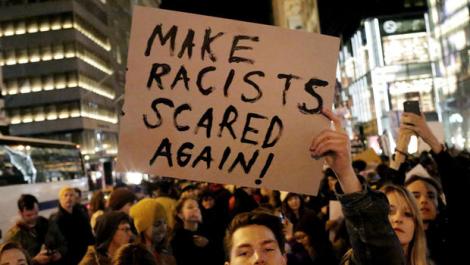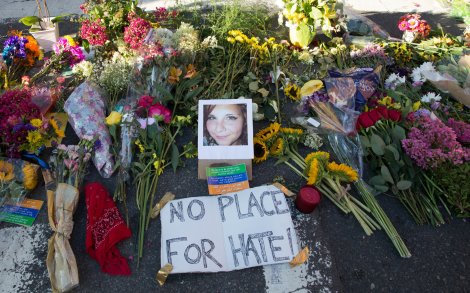After this week’s events in Charlottesville, Elaine Crory asks if Intersectional theory can really be blamed for the growth of the Alt-Right.
Things have suddenly become very real, this time in front of the world’s media in Charlottesville, Virginia, as the so-called alt-right finally outed themselves as what most of us precious SJW snowflakes have said they are for years now; white supremacist neo Nazis. And yet, somehow, some still don’t see the swastikas on the wall. It seems obvious that the US President should denounce them, but he won’t. It seems obvious that liberals who have dithered over no-platforming them and their ilk should see the error of their ways, and yet again and again the media are portraying the events in Charlottesville as a “clash” of two equally weighted sides.
It also seems obvious that those elements on the left that have wrung their hands over the allegedly divisive intersectional approach of feminists, LGBTQ activists and movements like Black Lives Matter should see the error of their ways, patch up their bruised egos and put their reservations about so called “identity politics” aside to fight a common enemy. But, again, there are no signs that they will. Worse, some are doubling down on their spurious claims, insisting that “identity politics” has actually encouraged the rise of the new Nazi movement by demonising straight, cis, white men and driving them to fight back. They point, in their defence, to the working class people in poor, Rust Belt states and run down de-industrialised cities who voted in their droves for Donald Trump in the 2016 election. Of course they did, goes the argument, to their eyes he has been a beacon of common sense standing for The Way Things Used To Be against pampered, middle-class student types who somehow imagine they are victims.

They’re wrong, by the way. Wrong in many ways, but top of the list is their own, possibly deliberate, misunderstanding of what intersectional theory is and what it is for. Coined by Kimberlé Crenshaw, intersectionality should be understood as a framework through which to understand the ways in which oppression and discrimination work. This approach outlines the ways in which an individual’s various identities overlap and create a specific relationship to power. These identities include race, gender, class, ethnicity, sexual orientation, gender identity, age, mental or physical disability, mental or physical health status and religion. Social class, you’ll notice, is high on that list as one of the ways in which a person might experience oppression.
Somehow this seems to have escaped those on the so-called left who like to claim that SJWs put all straight cis white men in the one basket. It’s strange, because it almost seems like a misapprehension that could be remedied with some judicious googling or a visit to the library. But that just isn’t happening. And that gets to the heart of the issue. It seems undeniable that some don’t want to drop their own prejudices (against women, most of the time) or examine the ways in which they are actually privileged, so it’s easier to pretend that intersectionality (or “idpol”, as some would have it) offers them nothing and to thrash it at every opportunity.

Ironically, if they did choose to engage seriously with intersectional approaches to understanding power and oppression, these people would find themselves empowered. Once again, class is one of the structures through which oppression must be understood. The people who rage against identity politics ought to understand that “working class” is an identity. It just doesn’t get seen that way because in most systems working class identity politics simply is politics. Patriarchy harms people of all genders and none, and it works hand in hand with capitalism to keep us all where it wants us. Understanding that fact is key to overthrowing the whole rotten structure.
So what now? Should social justice warriors back down before anyone else gets hurt? Should we accept the view that both sides are engaging in nasty protests, that neo Nazis have a right to march around with torches waving Confederate flags and giving Nazi salutes; that they only went too far when they drove a car at speed into a crowd? In short, no.
Remember that the Charlottesville protest began as an alt-right protest against the removal of a statue of General Robert E. Lee from a university campus, something the self-appointed free speech defenders of the alt-right have derided in the past. “Reals, not feel”, right? Ironically, the same people would cheer loud and proud for the toppling of a statue of Saddam Hussein or Stalin. If they found themselves on holiday in Berlin or Rome they would be thoroughly miffed to find statues of Hitler or Mussolini still in situ in public parks. And we all intuitively know why, too. Those men were dictators, they oppressed many of their subjects, caused death, division and fear.
If we accept that as a legitimate approach to the wrongs of history, what kind of justification can there be to defend statues of men who committed similar atrocities against black people in the United States? It’s strange how uncomfortable the polo shirt and khaki wearing, upstanding white folk become when a light is shone on the means their own ancestors used to climb to the top, strange how quickly armed militias appear on the scene, swastikas get waved and violent attacks begin.
Or, really, not strange at all. I urge all those who want to tackle this problem to put aside the rhetoric that claims “both sides” are as bad as each other, that uses free speech arguments to defend hate speech and that is fine with gatherings of the far right up until the moment someone gets killed. But most of all,I urge them to look again at intersectional analyses of oppression and conflict. There is more there for you than you seem to recognise, and perhaps also the means for us all to defeat the enemy on the right.

Pingback: After Charlottesville: We Need More Than Intersectionality to Win | The Last Round·